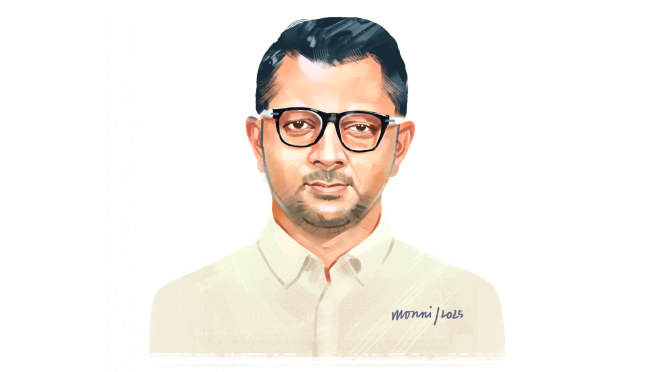‘True leadership thrives when educational institutions and industries work together’
‘True leadership thrives when educational institutions and industries work together’

In today’s increasingly complex, interconnected, and competitive global business environment, strategy and leadership excellence have become crucial for success. Future strategists, business leaders, and aspiring entrepreneurs must continuously sharpen their skills in these critical areas to achieve both personal and organisational goals.
While the rest of the world is prioritising on such skill development, Bangladesh continues to offer degrees only in traditional theoretical subjects. Millions of educated unemployed graduates are being produced. Yet, the job market struggles to find qualified candidates, especially for leadership positions.
Soft-skill-based education is still a new phenomenon in Bangladesh — something people can hardly imagine. Against that backdrop, the University of Dhaka dared to introduce the Department of Organisation Strategy and Leadership back in 2016, aiming to nurture the next generation of strategists, leaders, and entrepreneurs.
One of the visionaries behind this department is Md Rashedur Rahman, who is currently serving as the Chairman and Associate Professor of the department.
“I used to teach in the International Business Department at the University of Dhaka before. Back in 2016, under the leadership of our founding chairman, Professor Muhammad Abdul Moyeen, the journey of this visionary department started,” he recalled.
In December that year, they consulted with around 20 CEOs to get a feel for how much demand this new subject might generate. The first batch of the BBA program started in 2017. Later, at the end of that year, they launched the Executive MBA program.
But what made him feel the necessity? In response, Md Rahman said, “The driving force of our economy is the ready-made garments sector. It’s unfortunate that we don’t have enough people capable of leading this industry. The same is true for almost every other sector.”
We always talk about bridging the gap between academia and industry. But little is done. The OSL department is working to ensure every course has at least one guest lecturer and includes industry visits.
“Each batch has eight semesters. So if there’s one industry visit per semester, that makes eight industry visits in total. On the other hand, we have around 40 courses, so if each course has a guest lecturer, students get perspectives from 40 different experts. These two opportunities will really broaden students’ outlook.”
The department’s curriculum is distinctively holistic. Out of 48 courses, five are project-based, and eight are Foundation Skills Development (FSD) courses covering English, a third language (such as Chinese), public speaking, and statistical software. This focus on communication, analytical, and strategic skills sets OSL apart from conventional programs. Students learn to think like organisational leaders from the very beginning—understanding vision, mission, strategy, and leadership dynamics.
Despite being a relatively new department, OSL graduates have already begun to make their mark—joining banks, multinationals, and pursuing higher education abroad.
However, OSL’s functions go beyond just the curriculum. They have an incubation center named ‘Innovation Creativity and Entrepreneurship Centre (ICE)’, which operates under the OSL department.
“With this center, we aim to support the transformation of innovative and creative ideas into sustainable entrepreneurial initiatives that enhance employability. The centre works on raising awareness about the role of innovation in Bangladesh’s socio-economic development.”
How do you define leadership? In response to this question, Md Rahman put it this way, “A leader is someone who influences others for a shared vision.”
Md Rahman believes that the crisis of leadership and governance in Bangladesh’s industries stems not from a lack of talent, but from deep-rooted structural and systemic issues.
“Despite being a nation of over 180 million people, the claim that there are no capable managing directors (MDs) is misguided. The real issue lies in poor corporate governance, lack of accountability, and the absence of a strong culture of training and professional development.”
According to him, a key factor is the gap between education and industry. Graduates from specialised disciplines often end up in unrelated sectors — BUET engineers in foreign companies or leather engineering graduates in banks — reflecting a severe mismatch between academic learning and market demand.
“The principal-agent problem explains much of the dysfunction. Boards of directors (the principals) are often politically influenced and fail to uphold proper governance, leaving the MDs (the agents) constrained. Without strong, independent boards, even the most capable leaders cannot perform effectively. In many cases, capable individuals are overlooked for leadership roles due to favoritism or political connections. Organisations often prefer compliant leaders over competent ones who might challenge unethical practices,” he explained.
A question often arises that why our neighboring country India consistently produces managing directors and corporate leaders — some of whom even come to Bangladesh and lead organisations here successfully. So why can’t we develop capable leaders from among our own graduates?
Md Rahman believes comparing Bangladesh with India highlights the importance of strong educational foundations.
“India’s IITs, for instance, produce leaders with critical thinking and problem-solving abilities, many of whom now lead global corporations. In Bangladesh, however, education remains largely theoretical, and training systems are underdeveloped. Neither the public nor private sectors invest adequately in human capital development, resulting in professionals who stagnate rather than evolve.”
This lack of learning leads to weak management across industries. Even in the RMG sector — the driving force of Bangladesh’s economy — leadership gaps are glaring. Owners often act as MDs themselves, reluctant to delegate authority or offer performance-based incentives to managers. The problem, therefore, is as much cultural as it is structural.
“Addressing this requires redefining how Bangladesh nurtures leadership. Education, training, and industry linkage must work together,” he concluded.


